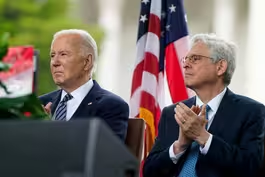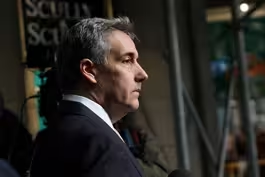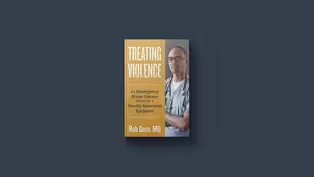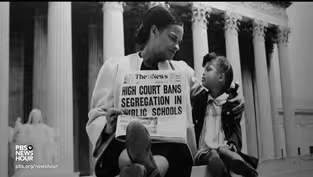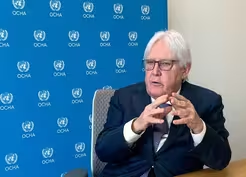
U.S. families working to save Gaza child with rare disorder
Clip: 5/16/2024 | 6m 17sVideo has Closed Captions
American families working to evacuate Gaza child facing rare medical disorder
Among the families caught in the war between Israel and Hamas is the Abu Zaiter family. Three-year-old Julia suffers from alternating hemiplegia, or AHC, an extremely rare neurological disorder that causes muscle stiffness, seizures and paralysis. Several families with children who have AHC have rallied to help Julia. Among them is Simon Frost, who discussed those efforts with Amna Nawaz.
Problems playing video? | Closed Captioning Feedback
Problems playing video? | Closed Captioning Feedback
Major corporate funding for the PBS News Hour is provided by BDO, BNSF, Consumer Cellular, American Cruise Lines, and Raymond James. Funding for the PBS NewsHour Weekend is provided by...

U.S. families working to save Gaza child with rare disorder
Clip: 5/16/2024 | 6m 17sVideo has Closed Captions
Among the families caught in the war between Israel and Hamas is the Abu Zaiter family. Three-year-old Julia suffers from alternating hemiplegia, or AHC, an extremely rare neurological disorder that causes muscle stiffness, seizures and paralysis. Several families with children who have AHC have rallied to help Julia. Among them is Simon Frost, who discussed those efforts with Amna Nawaz.
Problems playing video? | Closed Captioning Feedback
How to Watch PBS News Hour
PBS News Hour is available to stream on pbs.org and the free PBS App, available on iPhone, Apple TV, Android TV, Android smartphones, Amazon Fire TV, Amazon Fire Tablet, Roku, Samsung Smart TV, and Vizio.
Providing Support for PBS.org
Learn Moreabout PBS online sponsorshipAMNA NAWAZ: Among the families caught in between the Israel and Hamas war is the Abu-Zaiter family, Amjad, Maha, and their two daughters, 5-year-old Sham and 3-year-old Julia.
Julia suffers from an extremely rare neurological disorder called AHC, or alternating hemiplegia, that causes muscle stiffness, seizures, and paralysis.
Only 1,000 cases worldwide have been confirmed.
Before the war, Julia managed with medication.
But AHC is triggered by stimuli, like loud noises and changes in temperature.
In a tent, in a war zone, Julia is today unable to sit or stand and is running out of medication.
A number of families with children who have AHC have rallied to help Julia.
Among them is Simon Frost, who I spoke with yesterday.
Simon, thank you for being here.
SIMON FROST, Father of Annabel: It's good to be here.
Thank you for having me.
AMNA NAWAZ: So, tell us how you came to know about Julia and her family in the first place.
What's the connection there between your families?
SIMON FROST: So my little girl has alternating hemiplegia of childhood.
And so does Julia.
We're a pretty close-knit community in AHC.
And we have a Facebook page where everybody communicates, because parents become quite expert in this disease and tend to consult each other on what's working and what's not working for their kids.
So I came across the family through there.
AMNA NAWAZ: And your little girl is named Annabel?
SIMON FROST: Annabel.
AMNA NAWAZ: She's 8 years old?
SIMON FROST: She is.
AMNA NAWAZ: How is she doing?
SIMON FROST: She's doing OK, but she has episodes, at least a few every week.
So it's nothing like what Julia is facing, but she does face some real problems with AHC symptoms.
AMNA NAWAZ: What did you think when the war first started and you knew that Julia and her family would be over there?
SIMON FROST: So I actually heard about Julia once the war had already started.
I didn't know that she was stuck in a war zone until a few weeks ago.
But when I found out about it, obviously, it terrified everybody in the community.
And knowing that a kid with those type of symptoms, paralysis and seizures and painful dystonia, all of these different symptoms of the disease, can be triggered by various different stimuli, and being in a war zone, where you're hearing all sorts of noise and are terrified at all times, we were fearing for her life and still are.
AMNA NAWAZ: What do you know about how she's fared over the last seven months?
What have you been able to hear from Amjad, her father?
SIMON FROST: So, I know that she's gone through a lot of painful dystonia episodes.
She's been paralyzed on and off for the last six months.
She hasn't had access to her medicines, which can prevent or halt episodes.
And she's been fed from a bottle because her parents can't feed her proper food.
So she's in a desperate situation right now, and everybody's worried about the worst.
But these episodes that she's having, she can't walk, she can't really talk.
She has altered sense of consciousness at this point.
And it's -- it really can affect the brain.
AMNA NAWAZ: Have you ever seen that kind of decline in a child with AHC?
SIMON FROST: So, unfortunately, yes.
Several kids in our disease die every year.
And it's terrifying to think of, but, sometimes, they have these episodes that are just not stoppable.
They look like they can't focus, they can't hear anything.
And it's scary to see.
They're nonresponsive.
Often, they are fully paralyzed.
Sometimes, they go into painful postures, where their muscles are contracted and they can't get out of a contraction.
And this -- it's incredibly painful.
The kids scream.
And there's nothing that you can do as a parent.
So that's what Amjad and the family are facing right now.
AMNA NAWAZ: We were able to connect with him on the ground in Gaza and he sent us this message.
AMJAD ABU-ZAITER, Father of Julia (through translator): We're asking for help to get Julia out of Gaza for treatment, because, if I stay here while the crossings are closed, I will lose my daughter.
And I don't want to lose her.
I want her to receive treatment and to be like other children, to play and stand and be able to walk.
AMNA NAWAZ: Simon, you are in touch with him every day, I understand, for the last several weeks.
What is it like for you to have that contact with him, to hear from him now, to know your family is here on this side of the world and his is there, enduring what they are?
SIMON FROST: Yes, it's desperate.
I think, on both sides, it's desperate.
We're trying our best to get the family out.
We have got an exit plan for them.
We just can't get them across the border at this point.
I know for many other families, they can't get their folks across the border.
We could have her in a high-quality hospital in UAE within 24 hours if the borders were open.
And our plan is to get them -- get the family, as many of them as we can get, to Al-Arish and then they may be back out to UAE, where we have a system of doctors on the ground ready to support her.
AMNA NAWAZ: What happens if you're not able to get her out?
SIMON FROST: Well, we fear for the worst.
We have managed to get medicines to her.
She's on five different medications.
We were able to get those to her through PCRF.
And we have managed to get her to a safe zone outside of Rafah.
We're doing our best to get her across the border, but those clearances are needed.
AMNA NAWAZ: When you say we, you're talking about you and this community of families that you have become a part of through your children.
Why has this become such a mission for you all?
SIMON FROST: Well, I think we all put ourselves in that situation.
We know how hard it is to look after kids with AHC in the best of times.
We're in a warm, comfy home in Washington, D.C.
They're in a war zone.
And it's hard for us.
I can imagine what it's like for them.
And I think it's easy for families to put themselves in that situation knowing what their kids go through.
AMNA NAWAZ: Communication can be spotty, so if you could get a message to Amjad right now, what would you want to say to him?
SIMON FROST: I'd want to say, hold out hope.
We certainly are, but we're doing our very best across the board as a team to get you out and get you and your family to a safe location, where we can get Julia stable.
AMNA NAWAZ: Simon Frost, thank you so much for being here and sharing the story of Julia and her family with us.
We appreciate it.
SIMON FROST: Thanks, Amna.
Biden blocks GOP access to special counsel interview audio
Video has Closed Captions
Clip: 5/16/2024 | 3m 49s | Biden uses executive privilege block GOP access to special counsel interview audio (3m 49s)
Cohen testifies for 3rd day in Trump hush money trial
Video has Closed Captions
Clip: 5/16/2024 | 4m 43s | What happened during Michael Cohen's 3rd day of testimony in the Trump hush money trial (4m 43s)
ER doctor reflects on treating trauma, preventing violence
Video has Closed Captions
Clip: 5/16/2024 | 5m 58s | Emergency room doctor reflects on treating trauma and preventing violence in new book (5m 58s)
FDIC audit reveals toxic culture, chair faces calls to quit
Video has Closed Captions
Clip: 5/16/2024 | 6m 46s | FDIC chair faces calls to resign after audit details toxic work culture at agency (6m 46s)
The lasting legacy of Brown v. Board and ongoing challenges
Video has Closed Captions
Clip: 5/16/2024 | 9m 12s | The lasting legacy of Brown v. Board and ongoing education challenges (9m 12s)
Outgoing UN humanitarian chief on handling global crises
Video has Closed Captions
Clip: 5/16/2024 | 8m 24s | Outgoing UN humanitarian chief on handling one of the worst years for global crises (8m 24s)
Providing Support for PBS.org
Learn Moreabout PBS online sponsorship
- News and Public Affairs

FRONTLINE is investigative journalism that questions, explains and changes our world.

- News and Public Affairs

Today's top journalists discuss Washington's current political events and public affairs.












Support for PBS provided by:
Major corporate funding for the PBS News Hour is provided by BDO, BNSF, Consumer Cellular, American Cruise Lines, and Raymond James. Funding for the PBS NewsHour Weekend is provided by...
